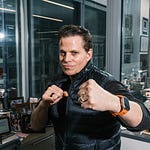In 2017, Jonathan Bush was busy running his healthcare company Athenahealth when Wall Street’s most feared activist investor began circling.
A nephew of President George H.W. Bush and cousin to President George W. Bush, Jonathan had carved out a name of his own in the world of healthcare technology.
He had founded Athenahealth in 1997, taken it public in 2007, and weathered a short-selling campaign from Greenlight Capital in 2014. So when another hedge fund emerged three years later, he wasn’t overly concerned.
“We had already had a big short squeeze with a big negative campaign from Greenlight Capital,” Bush said in an interview with The Profile. “I didn't know what Greenlight was, and I didn't know what Elliot was.”
But those familiar with Paul Singer’s Elliott Management knew better. The activist hedge fund is known for its no-holds-barred tactics — and it had set its sights on Bush.
In May 2017, Elliott acquired a 9% stake in Athenahealth, launched a campaign pushing the company to explore strategic alternatives, and made an unsolicited takeover offer, criticizing what it called operational “failures.” “It was a deeply personal program that ran very well for [Elliott], and that neither I nor my board were equipped to handle,” Bush said.
Then, seemingly out of nowhere, decades-old allegations against Bush resurfaced in the press — including accusations of domestic violence and inappropriate workplace behavior. While it remains unclear whether Elliott was behind the leaks, the move fit the firm’s aggressive playbook when targeting CEOs.
The resulting pressure led to Bush stepping down as CEO in June 2018. “I was riddled with shame and negativity and relief — you know, every emotion,” he said.
Just five months later, Athenahealth was acquired for $5.7 billion by Veritas Capital and Evergreen Coast Capital, an affiliate of Elliott.
Bush retreated from public life, spending time with his kids and reassessing. In 2020, he launched Zus Health, a health data startup aiming to finish what he started at Athenahealth. Backed by more than $70 million from investors including JAZZ Venture Partners, F-Prime Capital, Maverick Ventures, and A16Z, Bush is back — and very much building again.
In this conversation, we discuss what it’s like to become the target of a public spectacle, get knocked to your knees, and find the will to get back up again.
This Q&A has been lightly edited for clarity and length.
🎧 LISTEN.
🎬 WATCH.
In 2017, Paul Singer’s Elliott Management started sniffing around Athenahealth. What was your initial thought when this started happening? Did you think you're going to be at war with them, or did you think this was just going to blow over?
BUSH: We had already had a big short squeeze with a big negative campaign from Greenlight Capital. I didn't know what Greenlight was, and I didn't know what Elliot was, and in both cases, I would get calls in the middle of the night when these things were announced with people calling with condolences. And I was like, ‘It's an investor. They don't have to like me. I've given the plan to the board. We're doing the plan, right? You know, whatever.” I wasn't aware of the sort of speciality in personal, ad hominem.
You think you were personally attacked?
Yeah, I think I was. I mean, yeah. Yeah. I didn't know what Elliot was, and I didn't know what The Daily Mail was until I found myself on the cover of it for beating my wife. So, yeah, it was a deeply personal program that ran very well for [Elliott], and that neither I nor my board was equipped to handle.
It was a big, big surprise. But you know, I'm still alive. The company's still alive — vastly more profitable, vastly slower growing. I thought it was really interesting and painful. Joy isn't happiness or safety. To me, joy is the full expression of life and striving, so it was a joyful experience in that regard.
Most CEOs enjoy the game of business when it's purely about business. But when suddenly, there are allegations about domestic violence and inappropriate work behavior, then it turns personal. Did your demeanor change?
My board had never been attacked either, and there was this parade of seagulls who follow these investors around and attach themselves. So we followed all their advice, which included not saying anything.
Did you want to say something?
Yeah. I had built the company’s reputation — and mine with it — on extreme candor. And all of a sudden, there's accusations, and the candor is gone. It turns into silence. And what's the semiotics there? ‘Maybe he's guilty.’ But I worked for the board, and that's what the board thought we should do. So I shut my mouth.
We'll never know the road not taken, but from my perspective, if I had it to do again, I would have said more.
What would you have said?
In particular about the things that came into the press, I would have said that I thought that this was beneath the lowliest capitalist, that it was impossible to contextualize this piece of paper from 20 years ago, and that therefore it was chosen, and that is disgusting.
After getting fired by your board and having to resign from the company you founded, how did that affect you personally?
Failure is good for you, but it's not fun.
I think whenever somebody gets ripped down, there's whatever accumulated asshole-ification that has been going on needs to be scrubbed. We all need that. Some of us use marriage, some of us use God, and some of us use good friends and wine.
But when you're wiped out, you scrub some of your arrogant barnacles off your hull. I had hubris. I didn't think anybody would attack. I thought my shareholders were completely aligned with my strategy. I checked with them all the time. So I just wasn't ready for the idea that there would be a new shareholder who wasn't one of our shareholders, who would become one in one night and then say, ‘Nope, that entire agenda is the reason we're here, and it's all exactly wrong, and you should be fired immediately, and your company should never be public again.’
In an interview you said, “My experience is running a company with a gun to your head is no way to run a company. Better to just say, ‘Pull the trigger.’” What did you mean by that?
We were not our best selves as a company with the secrecy, the fear, and the detectives that were following people. This was a company with 10% market share of just ambulatory physicians. I thought this was an $80 billion revenue opportunity, and all of a sudden, we had the caution of, you know, Cigna or something — a company that had been around for hundreds of years that had reached its extent. I felt like this is not good for whoever owns these shares.
The energy at Athena had been optimistic and fail-friendly. All of a sudden, failings were proof of something. People started leaving, and we had people not joining.
Did this experience with Elliott change you?
I think dings and dents are wonderful for character-building, for sense of humor, for compassion. I get calls from people who are being attacked, and I'm flattered. My hug is a different one from somebody who hasn't actually had a great fall. I'm lucky to have that hug to give and wouldn't have had it without that experience.
I think everything in life is all right. I mean, it's up to you if you decide to make it something you're thankful for, but I strongly recommend it, regardless of what it'll be.
In 2020, you founded a new healthcare company called Zus Health. Given your past experience, would you ever take Zus public?
One hundred percent. Oh God, yeah. I'd go right into the valley of the shadow of death.
Eat the freaking hemlock. Let's go. Let's get after the truth. The truth is the American Dream is what holds us together, and if it's exclusively available to the two-in 20s and their university endowments, then the whole thing falls apart.
So let's make it a better stock market. Let's make it run better. Let's give new avenues for it. Let's challenge NASDAQ and NYSE. Let's challenge the freaking SEC chasing risk away from investment. Like, what? Let's do that stuff, but let's eat the hemlock and live by the rules and give people liquidity, not just the little group.
And the cold start is a hard step in the world. Not a lot of cold starts work. I'll tell you this, if Zus goes public, I won't be the CEO. Not because I wouldn't love it. I would adore it, but I also adored, as Jeff Bezos said, the fourth grade. I think the cold start is different from the running of a business. The cold start takes luck and reputation and faith, and there's an alchemy to get past $10 or $20 million.










